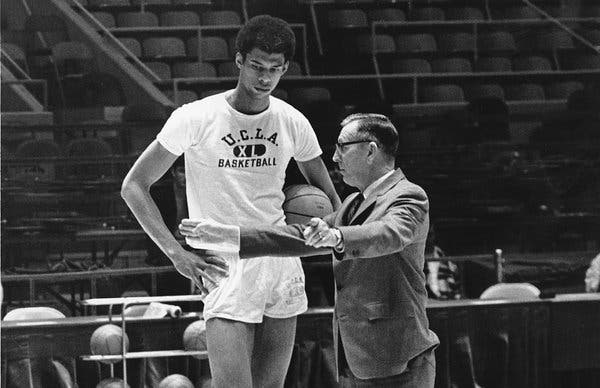
“John Wooden is about as perfect a sports personality as anyone that I have met in my 40 years of broadcasting. The man was a sports Abraham Lincoln.”
Think of all the sports that exist. Now think of the different levels of sports –- high school, college, and the professional level. Imagine the hundreds of thousands, maybe millions, of coaches who have taught these games. From that massive number of coaches, ESPN had to pick the one coach who was the best of all time. The committee unanimously named Coach John Wooden — the head basketball coach of the UCLA Bruins from 1948 to 1975 — as the greatest coach of the 20th century. Several years later, The Sporting News also named Wooden as the greatest coach of all time (the G.O.A.T.). In large measure this was because his teams won 10 NCAA Men’s National Championships in his final 12 years at UCLA. This is a feat that has never been equaled and probably never will be.
John Wooden was an “old school” coach. He believed that his job went well beyond coaching athletes. His mission was to develop young people into successful adults. To coaches like Wooden, basketball lessons in fact were life lessons. He saw himself as preaching principles and standards to live by. Coach Wooden was wise enough to know that life is a series of peaks and valleys and that it was his job to prepare his team members to adequately manage the inevitable ups and downs of their adult lives. Therefore, his rules were strict and he didn’t make exceptions for his star players. It was “his way” or it was “no way.” For example, in 1974, Coach Wooden kicked Bill Walton, the reigning national player of the year, out of the first practice of the year because his hair was too long. Coach Wooden also did not tolerate players showing up late, and he did not allow players to swear.
There actually are websites that are solely devoted to wise things that Coach Wooden has said that are considered to be universally invaluable to emerging young adults:
- “Be more concerned with your character than your reputation, because your character is what you really are, while your reputation is merely what others think you are.”
- “If you don’t have time to do it right, when will you have time to do it over?”
- “Make each day your masterpiece.”
- “Never lie, never cheat, never steal.”
- “Nothing will work unless you do.”
- “Do not mistake activity for achievement.”
- “Success comes from knowing that you did your best to become the best that you are capable of becoming.”
- “Never try to be better than someone else, but always try to better yourself.”
- “Things turn out best for the people who make the best of the way things turn out.”
- “The best competition I have is against myself to become better.”
- “Whatever you do in life, surround yourself with smart people who’ll argue with you.”
John Wooden literally wrote the book on leadership. He called it the Pyramid of Success. It is a series of building blocks that form a solid foundation for success in life. This foundation is formed by traits such as enthusiasm, self-control, poise, and confidence. These traits each lead to the top of the pyramid: “Success.” According to Wooden, “Success is a peace of mind which is a direct result of self-satisfaction knowing you did your best to become the best that you are capable of becoming.” It is noteworthy that the best coach of all time never spoke about winning or titles. Instead, he spoke about self-satisfaction, character, and doing your best. According to John Wooden’s definition of success, you are the only person who can truly determine your success, be it in sports or life. Success goes to that person who genuinely gives everything he or she has to improve, no matter how it actually turns out. And, as a basketball coach, Wooden knew that if his players held themselves to this standard, team success surely would follow.
Before Wooden earned the nickname as the “Wizard of Westwood” at UCLA, he was a 3-time All-American at Purdue University. He then coached basketball and taught English for 12 years in the high school ranks before he proudly served his country as a Naval officer in WWII. After the war ended, he briefly coached basketball and baseball at Indiana State University. In 1948, Wooden was offered two quality jobs to coach basketball. One was at the University of Minnesota and the other was at UCLA. Wooden very much favored the Minnesota job, which would allow him to remain in the Midwest. In fact, he scheduled two phone calls on the same date. He planned to accept the Minnesota job at 6 p.m. and then break the bad news to UCLA at 7 p.m. However, as fate would have it, a snowstorm in Minneapolis prevented university officials from getting to a phone to officially offer Wooden the job. At 7 p.m., the phone rang on time from UCLA. Wooden accepted the $6,000 a year job and went to work.
In his first year, Wooden turned a perennial losing program into a 22-7 team, the most wins ever compiled at UCLA. He did this by focusing on high standards, strict rules and teaching the basics. For example, he would spend 30 minutes of the opening practice each year with a tutorial on how to properly put on socks and lace-up shoes. Although many of his players may have rolled their eyes, Wooden was doing this to prevent blisters and unnecessary injuries. Wooden was a stickler for details and every second of every practice was precisely planned. If a player didn’t do things exactly the way Wooden wanted them done, that player would quickly find himself at the end of the bench. Finally, Coach Wooden’s very best skill probably was getting his players to play as a team and to believe in each other.
Although Coach John Wooden now is considered to be the G.O.A.T., his Bruins did not win a national championship during his first 14 years. As Wooden put it, there were always “ifs” and “ands” that kept his teams from achieving greatness in the post season. So, he kept evolving, improving and adopting his coaching philosophy. After a disappointing 14-12 season in 1960, he critiqued every aspect of his system and made significant changes. The thing was, Coach Wooden always possessed a burning desire to ask questions, find answers, and flexibly adapt. As he said, “Failure is not fatal, but failure to change might be.”
Make no mistake about it, Coach Wooden was a basketball genius. He developed a fast-paced offense and instilled a high-pressure defense. Through his relentless attack, he would wear down the other team and impose his will by the end of the game. Ironically, if you saw him in action, you would see a quiet, soft-spoken man who looked and acted more like Mister Rogers than a big-time college coach. He did not swear and he did not yell. His players came to know that he was upset when he said, “Goodness gracious, sakes alive.” However, that quiet, almost saintly, social persona was responsible for building one of the most powerhouse programs of all time at UCLA.
In 1964, it all came together, as the Bruins went undefeated and won the national championship. This began the era that would culminate in 10 championships over the next 12 years. The Bruins had four seasons without a single loss. They also had two giant winning streaks: one of 47 games with Kareem Abdul Jabbar, and one of 88 games with Bill Walton. In 1972, UCLA was so dominant that their average margin of victory was 30.3 points per game. Then, at the height of his career, Coach Wooden retired in 1975 after winning his 10th national championship with a career winning percentage that exceeded 80%.
Coach Wooden was a much-admired household name while he was at UCLA. After he retired, people across the nation continued to show him love and respect. He had become a major media resource for insights into both sports and life. He wrote several best-selling thought-provoking books, his Pyramid of Success had become a staple for many modern-day coaches, and major corporations were recruiting him to deliver inspirational lectures.
John Wooden died at the age of 99. In his lifetime, he became one of the best examples of successful leadership the world has ever known. Longtime basketball announcer, Dick Enberg, said it best this way: “John Wooden is about as perfect a sports personality as anyone that I have met in my 40 years of broadcasting. The man was a sports Abraham Lincoln.” Former player, Bill Walton also expressed the sentiments of every player to ever play for the man, “I would like to thank you coach for everything; all of the lessons of life; all the gifts; everything that you’ve done. I love you.” Another former player, Keith Erickson, opined: “It’s an honor for us to have been around this man. He’s a national treasure.”
John Wooden is one of the 144 “Wednesday Role Models” featured in the Student Athlete Program. This program is designed to improve the character, leadership and sportsmanship of high school athletes. To learn more about this program and how you can implement it in your school:
Check out the Student Athlete Program